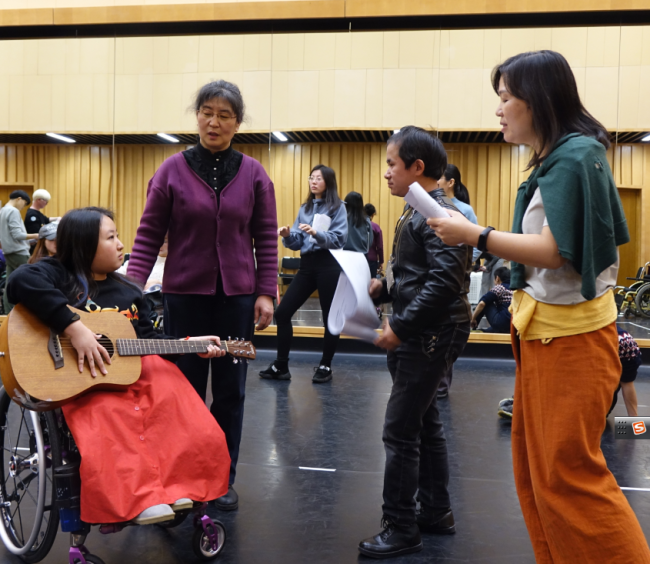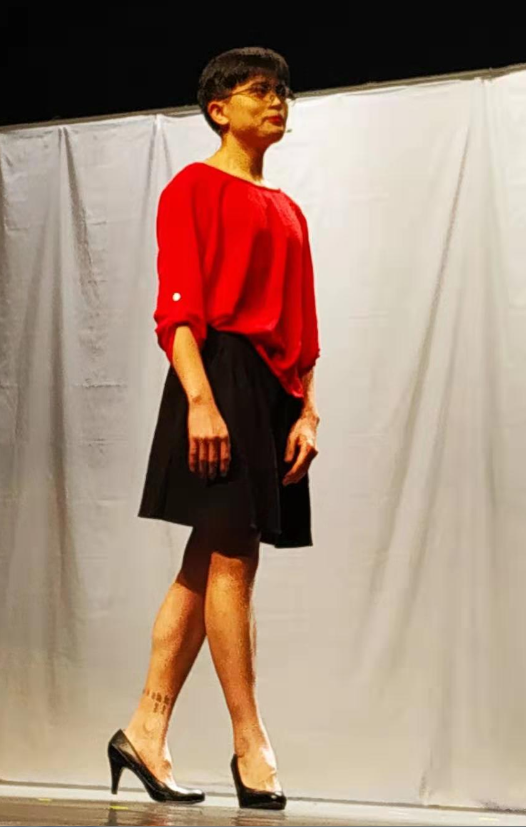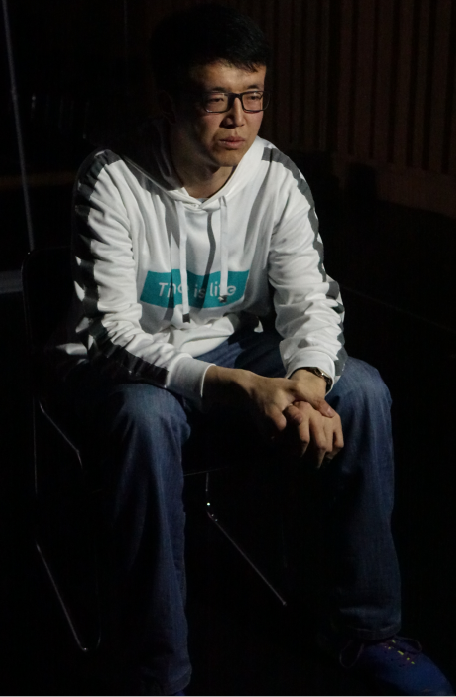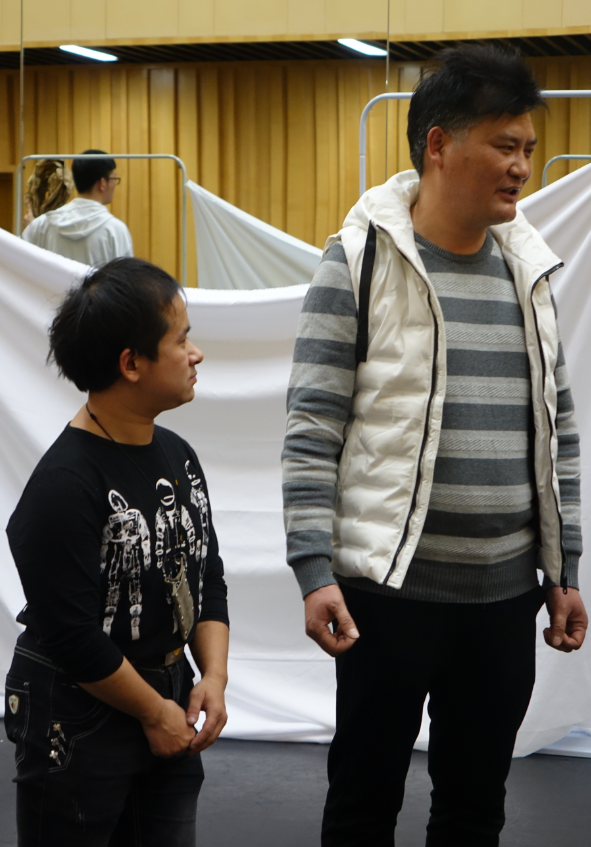People with rare diseases tell life stories in a stage play
An original stage play has been shown to the public in Beijing to mark the twelfth international Rare Disease Day, which falls on the last day of February every year. Fifteen patients with rare diseases and their relatives told their life stories in the play, which was titled the Rare Hug. So how was the play received by the public? What is life like, living in China with a rare disease, as a patient or as a relative of someone who has one?
Hello and welcome to Selfie, the show that gets to the heart of Chinese society, life and the economy. I’m Tony Reid. In this edition of Selfie, China Plus’s Wang Lei takes us to meet some patients with rare diseases to hear their stories of how they face the challenge.
Play director Chen Meiping explains why the play was called Rare Hug.

Director Chen Meiping (right) gives directions to actors of the stage play Rare Hug during the rehearsal. [Photo: by courtesy of Wang Xiaohan]
The director revealed that the fifteen actors of the play were recruited from rare disease communities around the country, and the show was deliberately timed so that the play could be staged to coincide with Rare Disease Day.
The theme of the Day this year was “Bridging health and social care”. The day was launched by EURODIS, the voice of rare disease patients in Europe on February 29th, 2008, specifically because it’s a rare date, occurring just once every four years.
Rare diseases are defined as chronically debilitating or life-threatening diseases with very low prevalence. In European Union countries, any disease affecting fewer than 5 people in 10 000 is considered rare. Each rare disease may be rare but there are lots of them in total – internationally about 7,000 diseases are classified as rare, 80% of them caused genetically and less than one percent with an effective treatment. Given the huge population base in China, it’s perhaps not surprising that the number of rare disease patients is 20 million. The National Health Commission of China released the first national list on rare diseases in June, 2018. Altogether 121 rare diseases are on it.
Cui Ying is one of the play’s actors. She suffers from osteogenesis imperfecta, a brittle bone disease also known as China Doll Syndrome, which is a group of genetic disorders that mainly affect the bones. Cui Ying was diagnosed with the disease at the age of four. Just as she was about to go to school, she was bumped into by a child in the kindergarten and she broke her legs. She was home schooled by a teacher and has been in a wheelchair since she was a teenager. Cui Ying explains why she took part in the performance.

Cui Ying (right) and other members of the Rock Band 8772 sings a song during the rehearsal of the stage play Rare Hug. [Photo: by courtesy of Yin Xiaoran]
In the audience are Yuan Nana and her husband Chen Lizhang, both sufferers of growth hormone deficiency. They co-founded a non-profit organization called Home for Little People in Beijing, which now helps 3000 registered little people across the country with medical care, employment guidance and psychological support. Yuan Nana watched the show.
Pan Longfei is one of the actors. He only found out he had Kallmann Syndrome when he was 23 years old. Kallmann Syndrome is a genetic disorder that inhibits the completion of puberty in teenagers.
Once he was diagnosed with the disease, Longfei got hormone injections. Half a year later, he grew taller; his face lengthened, and beard and body hair started to grow. This made him happy at last, and he started to dream of emulating Andy Lau, the popular Hong Kong actor and singer-songwriter. He wanted to have a voice like that of his idol’s.
To his dismay, Longfei came to realize that the short growth period he had enjoyed would be the end of it, and he was not going to grow any more inches.
It didn’t matter how long he hoped and waited. It was clear that he would never become as strong and manly as he wanted.
Then in 2014, he played a woman in a drama for the first time and saw himself in the mirror. He was stunned by his own beauty.

Pan Longfei tells his experience of discovering the real self in the stage play Rare Hug. [Photo: by courtesy of Wang Xiaohan]
Eleven-year-old Yinyang Sihan finishes watching Rare Hug. He’s only been able to hear it thanks to the cochlear implants in his ears.
His mom explains why she brought her son to the show.
Huang Jing is another actor in the play. She suffers from congenital spina bifida, a birth defect which results in the backbone and membranes around the spinal cord not being able to close up completely. She explains why she wanted to come all the way from Chengdu, in southeast China’s Sichuan Province, to Beijing for the rehearsal and performance of Rare Hug.
Huang Jing came a long way to get where she is today. The disease has not only severely damaged her ability to walk, but also resulted in serious problems with bladder and bowel control. She was forced to quit after the first year in junior middle school, which was far away from home. At the time, she felt so inferior to others that she subconsciously would lower her head in front of people. After being confined to her home for several years, she was eager to leave and make a living on her own. In 2006, she started to live by herself in Chengdu.
In 2012, Huang Jing joined a humanitarian group to help people who suffered from a similar condition as hers. But later she wanted to do more than just holding seminars to create awareness about the disease.
In 2015, she began to work for a nonprofit organization in the field of corporate social responsibility. During one visit to the countryside, she suddenly felt enlightened.
The confidence in her inner ability also gave her the courage and style to choose a real partner for herself.

In a rehearsal of the stage play Rare Hug, Huang Jing who suffers from congenital spina bifida, declines the offer of a young man as she believes she is not looking for a nanny in marriage but a true partner. [Photo: from China Plus]
Huang Jing is now working for a Chengdu-based non-profit institute which is committed to helping people with congenital spina bifida. In 2018, six people in her community had to have amputations because of pressure sores. Huang Jing says her biggest wish is to prevent tragedies like this from happening again. She wanted to spread knowledge about preventing fatal complications such as blood poisoning, or uraemia.
Another actor, Su Jiayu, is two meters – or six feet seven inches – tall. You might think he is a basketball player. But in fact his height is the result of a rare disease called Marfan syndrome, a genetic disorder that endangers the heart, blood vessels, bones, joints, and eyes.
The young man narrowly escaped death several years ago when he was still in college. One night, when he was playing video games with his roommates in the dormitory, he suddenly felt a stabbing pain in his back, which gradually turned into a growing, gnawing belt of pain. He felt his whole back was being cut open with a knife. He began to panic and was rushed to hospital by his roommates. He recounted the experience to the audience of the play.

Su Jiayu, a patient of Marfan syndrome, tells his life experience to the audience of the stage play Rare Hug. [Photo: by courtesy of Wang Xiaohan]
No one in the family slept that night. Seven days later, he was discharged from hospital, not because he was well, but because he had to go home to wait for news about whether he could have some surgery which was beyond the capability of the local hospital. For more than a year, his parents had to shoulder all the pressure and worry of the situation. Finally he got a call from Beijing. He was given a twelve-hour operation, which left him with an artificial blood vessel and a 70-centrimetre long incision.
Su Jiayu now works for the Beijing Illness Challenge Foundation, the very first public welfare foundation in Beijing to focus on rare diseases. Back in 2014, he joined a rock band made up of people who live with rare diseases. The band was named 8772, as the Arabic numbers 8772 are similar to BTTZ, which are the initials of the Chinese characters for Illness Challenge.
Jiayu remembers that their band asked all the members to hand in some old photos that were taken when they were little kids, the younger the better. He thought this might be too hard to find as the house had been refurbished. But his mother quickly sent him some old photos through wechat within seconds, telling him jokingly that if she couldn’t do something as small as that, how she could still be called a mom.
Wang Zhongyao is another actor. His son was diagnosed with brittle bone disease at birth, and he shares the same wish. Just fourteen years old, his son has had to have 12 operations since his first one at the age seven.
The scene was reproduced in Rare Hug. When Wang Zhongyao led his son to meet the principal of the school to pay the tuition fee, the principal asked to be alone with Wang to say something. Wang then told his son to watch the others play basketball on the playground.

In a rehearsal of the stage play Rare Hug, Wang Zhongyao (right) takes his son who has brittle bone disease to see the principal of the school. [Photo: by courtesy of Wang Xiaohan]
To his greatest joy, after all these years’ treatment and rehabilitation training, Wang’s son can now live and walk normally, like any other teenager. Wang Zhongyao came from Shandong Province to Beijing for the show. He wishes the drama will help raise people’s awareness about rare diseases and win more support for rare disease communities.
Wang Yi’ou, head of the Illness Challenge Foundation, also lives with brittle-bone disease. In 2008, she founded the China-Dolls Centre for Rare Disorders, which later became part of the Illness Challenge Foundation in 2014. Looking back, Wang Yi’ou says she has seen great progress being made.
Despite the changes, Wang Yi’ou says there is still great urgency to increase the supply of drugs which are desperately needed by rare disease patients to treat their rare medical conditions.
Huang Shangzhi, a professor with the Peking Union Medical College Hospital, has been working on researching rare diseases over the past 40 years. He says researchers like him have been greatly encouraged by a series of policies issued by the government since 2018.
Sun Gege is a folk costume designer and a business owner. After watching the play, she felt that she could also give a helping hand.
Twenty-two year old Gong Xiaohan has just graduated from college as a linguistics major. Few knew that the vivacious girl was in fact a sufferer of Myasthenia Gravis, a long-term neuromuscular disease that leads to varying degrees of skeletal muscle weakness. Xiaohan says she plans to pursue a master’s degree in psychology.
Tian Xiao, who has haemophilia, believes the future of patients like him is shaped together, by everyone in our society.

People with rare diseases tell life stories in a stage play
A group photo is taken for all the actors and organizers in the stage play Rare Hug which was shown to the public at the Tianqiao Art Centre on February 27, 2019. [Photo: by courtesy of Yin Xiaoran]
For more information, please click the audio above to find out more about the show and the rare disease patients.

